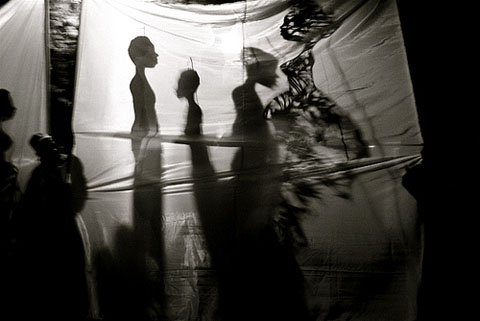Marlon Griffith’s Walk into the Night (2009), a large-scale public performance work in Cape Town. Photography by Wendel Fernandez, courtesy the Small Axe blog
This morning the John Simon Guggenheim Memorial Foundation announced the 2010 Latin American and Caribbean Guggenheim Fellowship Awards. “Guggenheim Fellows are appointed on the basis of stellar achievement and exceptional promise for continued accomplishment,” the foundation explains. The award comes with a financial grant to support each fellow’s research or creative work. I’m delighted that two Trinidadians have made the 2010 list: artist Marlon Griffith and writer Robert Antoni.
Griffith “is an artist whose practice is based upon a reciprocal dialogue between Mas (the artistic component of the Trinidad Carnival) and art . . . it is situated at the intersection of the visual and public performance.” His performance works and installations are rooted in a deep theoretical and practical understanding of mas, and his recent major projects include large-scale, collaborative public performance works in Cape Town and Gwangju. Closer to home, last September he installed a series of “shadow drawings” on large fabric panels at Alice Yard, the contemporary art space in Port of Spain which your Antilles blogger helps run. He showed his Powder Box (2009) series in the recent Rockstone and Bootheel exhibition at Real Art Ways in Hartford, Connecticut, and his series of Symbiosis (2008) prints is included in the Global Caribbean show that ran from December 2009 to March 2010 at the Little Haiti Cultural Centre in Miami (and moves to the Musée International des Arts Modestes in France this month). He has also worked and shown in London, New York, Kingston, Toronto, and elsewhere. Selections from his work are featured at his blog, Textured Spaces.
Antoni is the author of four works of fiction: the extraordinarily ambitious Divina Trace (1991), winner of the Commonwealth Writers’ Prize; Blessed Is the Fruit (1997); My Grandmother’s Erotic Folktales (2000); and Carnival (2005). (You can read a review of the latter from the November 2005 CRB here; Antoni also has a story in the Trinidad Noir anthology, reviewed in our May 2009 issue.) His website includes an excerpt from his current work in progress, and in 2005 he was interviewed by Lawrence Scott for BOMB. In that conversation, he remarked:
Lamming, Walcott, Brathwaite, Naipaul and others talked about having to invent everything from scratch in order to write the West Indian novel or poem, but I’ve never felt that way. I felt that I came to writing with a Caribbean literature already intact that I could respond to. The other thing that I believe you and I have in common is that we’ll go wherever we need to invent our literary heritage. If it’s García Márquez or Faulkner, Jean Rhys or Toni Morrison, Joyce or Hemingway or whoever, it’s all part of our private territory, the literary landscape we’ve claimed.





